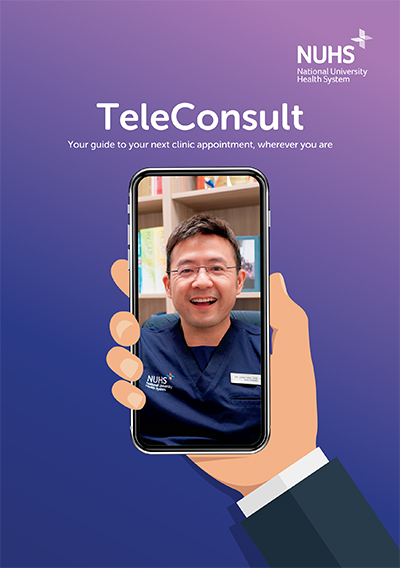What is TeleConsult?
Teleconsultation is a type of telemedicine service, where digital information and communication technologies, such as computers and mobile devices are used to deliver health-related information. It provides opportunities to make healthcare more convenient, better coordinated, and closer to home.
In a teleconsultation, patients can have consultations with doctors, nurses and allied health professionals in the comfort of their homes or at a location where privacy is assured. These virtual appointments enable patients to receive ongoing care where in-person clinic consultations are not necessary or possible.
Patients can expect to receive the same level of patient care and medical attention from our healthcare professionals. Medications, Medical Certificates and/or memos, if any, can be issued after a TeleConsult.
Who is eligible for TeleConsult?
Typically first outpatient visits are conducted face-to-face in the clinic. Based on our care team's assessment, TeleConsult may be offered for the subsequent clinic consultation. Common conditions that are non-emergency in nature can be treated via TeleConsult. Access to the internet through a smart device is required for video consultation. After the session, you may be required to follow up in person for additional health services.
Benefits of TeleConsult
Convenience
- Our healthcare professionals can treat and review common medical and surgical conditions without you having to travel to our clinics
- Medical Certificates will be sent to you
- Have your medications delivered to your doorstep
- Pay for your clinic appointment via one of the many payment platforms available
Time & Cost Savings
- Save time and money on travelling
- Caregivers need not accompany you to the hospital and wait with you
- No more waiting at the clinic and pharmacy
Safety & Privacy
- Reduce exposure to infections while commuting and at the hospital
- Discuss your condition with our healthcare professionals from the privacy of your own home or at a location where privacy is assured
How a typical TeleConsult is done at NUHS?
Watch the video below to find out more about what you can expect from TeleConsult.
TeleConsult Brochure & User Guide
This brochure includes information on the modes of teleconsultation and its benefits. You can also find out more about your eligibility for teleconsultation and what you need to prepare for a teleconsultation session.
Download the brochure here (PDF, 7.03 MB).
Download the guide here: English (PDF, 1.2 MB) | 中文 (PDF, 4.37 MB) | Melayu (PDF, 1.21 MB) | தமிழ் (PDF, 1.23 MB)
Find out more about the NUHS App here.


















